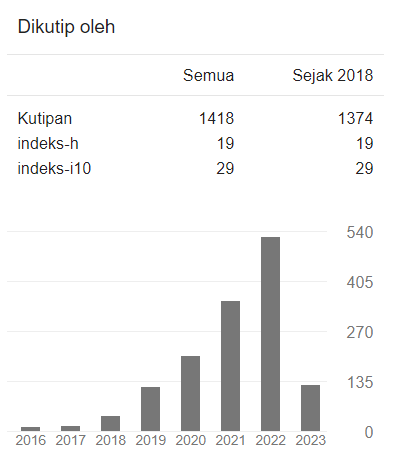Penguatan Pendidikan Karakter di Sekolah Dasar: Studi Implementasi di SD Brawijaya Smart School
DOI:
https://doi.org/10.22219/jp2sd.v10i2.22490Abstract
The 21st-century skills focus on cognitive aspects and various complex aspects, including character-related ones. The emergence of various phenomena, such as catching up with children, bullying, and several cases of moral degradation in the younger generation, reinforces the importance of strengthening character education, especially at the basic education level. To develop the implementation of character education, many primary education institutions have a program strategy to create a school culture that supports the formation of the character of students. SD Brawijaya Smart School is one of the schools that implements character education at the elementary school level. This study aims to strengthen religious character education in schools, supporting and inhibiting factors. The researcher used an approach with a descriptive type. The results show that to build religious character, schools have done several things, including (a) habituation of reading Asmaul Husna, (b) habituation of disciplined attitudes, (c) habituation of responsibility attitudes, and (d)Qur'an literacy habituation. The supporting factors support the character of the school (a) the support from the parents of students, (b) the commitment of the entire school community, and (c) adequate facilities. In addition, there are inhibiting factors that strengthen the character, including (a) the availability of students' internet networks that are not evenly distributed, (b) limited time for courageous learning, and (c) the need for awareness of students
Downloads
References
Akbar, S. (2010). Model Pembelajaran Nilai dan Karakter Berbasis Nilai-Nilai Kehidupan di Sekolah Dasar. Jurnal Imu Pendidikan, 46–54.
Anggraini, P., & Kusniarti, T. (2016). The Implementation of Character Education Model Based on Empowerment Theatre for Primary School Students. Journal of Education and Practice, 7(1), 26–29. https://files.eric.ed.gov/fulltext/EJ1089767.pdf
Badeni, Saparahayuningsih, Sri, & Wachidi. (2019). Who is Responsible for the Child’s Moral Character Education? Education Quarterly Reviews, 2(1), 23–32. https://doi.org/10.31014/aior.1993.02.01.35
Bates, A. (2019). Character education and the ‘priority of recognition.’ Cambridge Journal of Education, 49(6), 695–710. https://doi.org/10.1080/0305764X.2019.1590529
Berkowitz, M. W., & Hoppe, M. A. (2009). Character education and gifted children. High Ability Studies, 20(2), 131–142. https://doi.org/10.1080/13598130903358493
Bildiren, A. (2018). Developmental characteristics of gifted children aged 0–6 years: parental observations. Early Child Development and Care, 188(8), 997–1011. https://doi.org/10.1080/03004430.2017.1389919
Bogdan, R. C., & Biklen, S. K. (2007). Qualitative Research for Education: An Introduction to Theory and Methods (A. E. Burvikovs (ed.); Fifth Edit). Pearson Education, Inc.
Cahyanto, B., & Afifulloh, M. (2020). Electronic Module (E-Module) Berbasis Component Display Theory (CDT) Untuk Matakuliah Pembelajaran Terpadu. JINOTEP (Jurnal Inovasi Dan Teknologi Pembelajaran): Kajian Dan Riset Dalam Teknologi Pembelajaran, 7(1), 49–56. https://doi.org/10.17977/um031v7i12020p049
Cahyanto, B., Masyinta Maghfirah, & Hamidah, N. (2021). Implementasi Pembelajaran Daring di Masa Pandemi Covid-19. At-Thullab: Jurnal Pendidikan Guru Madrasah Ibtidaiyah, 5(1).
Danawati, M. G., Regina, B. D., & Mukhlishina, I. (2020). Analisis Nilai Karakter pada Buku Siswa Tematik Sekolah Dasar Berorientasi Pendidikan Karakter. Jurnal Pemikiran Dan Pengembangan Sekolah Dasar (JP2SD), 8(1), 60–70. https://doi.org/10.22219/jp2sd.v8i1.12369
Dewi, E. R., & Alam, A. A. (2020). Transformation model for character education of students. Cypriot Journal of Educational Sciences, 15(5), 1228–1237. https://doi.org/10.18844/CJES.V15I5.5155
Haslip, M. L., & Haslip, M. J. (2013). From Malaysia to America: Community-Based Character Education for Children and Youth. Childhood Education, 89(5), 296–302. https://doi.org/10.1080/00094056.2013.830899
Indrayani, L., Artini, L., & Seken, K. (2018). Character Education Practices at a Piloted Primary School. 173(Icei 2017), 4–7. https://doi.org/10.2991/icei-17.2018.48
Kusumastuti, A., & Mustamil, A. K. (2019). Metode Penelitian Kualitatif (F. Annisya & Sukarno (eds.)). Lembaga Pendidikan Sukarno Pressindo.
Lickona, T. (1996). Eleven principles of effective character education. Journal of Moral Education, 25(1), 93–100. https://doi.org/10.1080/0305724960250110
Lukman, Marsigit, Istiyono, E., Kartowagiran, B., Retnawati, H., Kistoro, H. C. A., & Putranta, H. (2021). Effective teachers’ personality in strengthening character education. International Journal of Evaluation and Research in Education, 10(2), 512–521. https://doi.org/10.11591/ijere.v10i2.21629
Manubey, J., Batlolona, J. R., & Leasa, M. (2021). Peer tutoring analysis in inclusive classes using character education approach. Journal of Education and Learning (EduLearn), 15(2), 303–311. https://doi.org/10.11591/edulearn.v15i2.19190
McGrath, R. E., Han, H., Brown, M., & Meindl, P. (2021). What does character education mean to character education experts? A prototype analysis of expert opinions. Journal of Moral Education, 00(00), 1–19. https://doi.org/10.1080/03057240.2020.1862073
Metcalfe, J., & Moulin-Stożek, D. (2021). Religious education teachers’ perspectives on character education. British Journal of Religious Education, 43(3), 349–360. https://doi.org/10.1080/01416200.2020.1713049
Miles, M. B., Huberman, A. M., & Saldana, J. (2014). Qualitative Data Analysis: A Methods Sourcebook (Three Edit). SAGE Publications, Inc.
Muhammad, A. R., Suhaimi, S., Zulfikar, T., Sulaiman, S., & Masrizal, M. (2021). Integration of character education based on local culture through online learning in Madras Ahaliyah. Cypriot Journal of Educational Sciences, 16(6), 3293–3304. https://doi.org/10.18844/cjes.v16i6.6559
Nada, H. N., Fajarningsih, R. U., & Astirin, O. P. (2021). Environmental education to build school members’ character. JPBI (Jurnal Pendidikan Biologi Indonesia), 7(1), 43–52. https://doi.org/10.22219/jpbi.v7i1.14283
Narimo, S., & Muhtar, S. (2020). Budaya Mengintegrasikan Karakter Religius Dalam Kegiatan Sekolah Dasar. Jurnal VARIDIKA, 32(2), 13–27. https://doi.org/10.23917/varidika.v32i2.12866
Nisak, N. M. (2018). Implementasi Kurikulum Pembelajaran Al Qur’an di Sekolah Dasar. Halaqa: Islamic Education Journal, 2(2), 150–164. https://doi.org/10.21070/halaqa.v2i2.1780
Paul, S. A. S., Hart, P., Augustin, L., Clarke, P. J., & Pike, M. (2020). Parents’ perspectives on home-based character education activities. Journal of Family Studies, 0(0), 1–23. https://doi.org/10.1080/13229400.2020.1806097
Siswinarti, P. R. (2017). Pentingnya Pendidikan Karakter untuk Membangun Bangsa Beradab. Retrieved August, March.
Susilo, M. J., Dewantoro, M. H., & Yuningsih, Y. (2022). Character education trend in Indonesia. Journal of Education and Learning (EduLearn), 16(2), 180–188. https://doi.org/10.11591/edulearn.v16i2.20411
Wuryani, M. T., Roemintoyo, & Yamtinah, S. (2018). Textbooks Thematic Based Character Education on Thematic Learning Primary School: An Influence. International Journal of Educational Methodology, 4(2), 75–81. https://doi.org/10.12973/ijem.4.2.75
Downloads
Published
Issue
Section
License
Copyright (c) 2022 Jurnal Pemikiran dan Pengembangan Sekolah Dasar (JP2SD)

This work is licensed under a Creative Commons Attribution-ShareAlike 4.0 International License.
Authors who publish with Jurnal Pemikiran dan Pengembangan Sekolah Dasar (JP2SD) agree to the following terms:
- For all articles published in Jurnal Pemikiran dan Pengembangan Sekolah Dasar (JP2SD), copyright is retained by the authors. Authors give permission to the publisher to announce the work with conditions. When the manuscript is accepted for publication, the authors agree to automatic transfer of the publishing right to the publisher.
- Authors retain copyright and grant the journal right of first publication with the work simultaneously licensed under a Creative Commons Attribution-ShareAlike 4.0 International License that allows others to share the work with an acknowledgment of the work's authorship and initial publication in this journal.
- Authors are able to enter into separate, additional contractual arrangements for the non-exclusive distribution of the journal's published version of the work (e.g., post it to an institutional repository or publish it in a book), with an acknowledgment of its initial publication in this journal.
- Authors are permitted and encouraged to post their work online (e.g., in institutional repositories or on their website) prior to and during the submission process, as it can lead to productive exchanges, as well as earlier and greater citation of published work (See The Effect of Open Access).

This work is licensed under a Creative Commons Attribution-ShareAlike 4.0 International License.


















